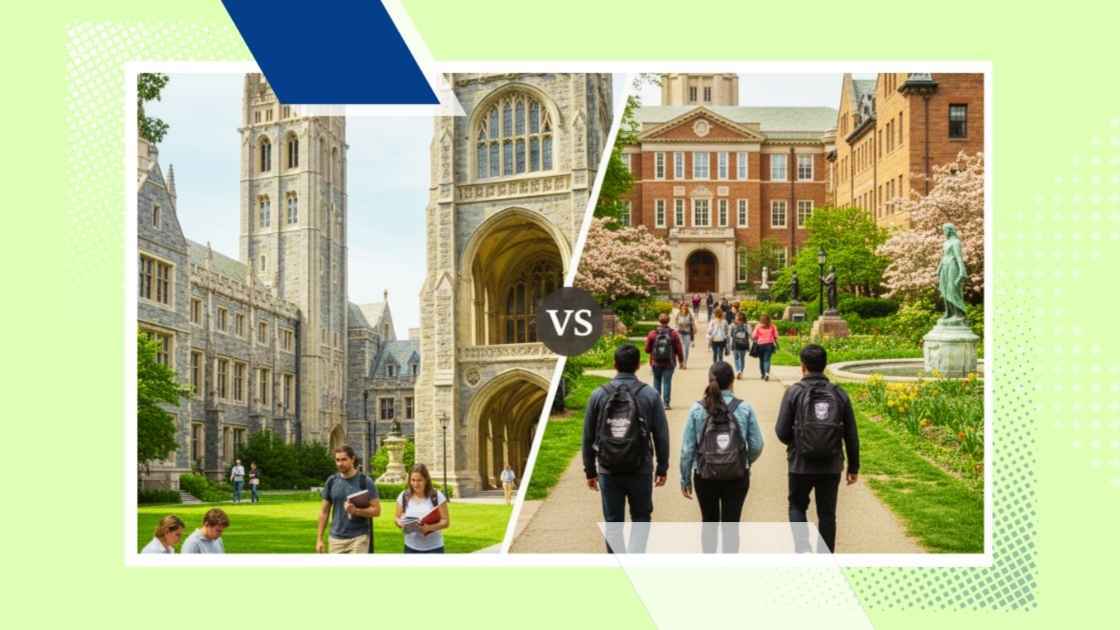Yale vs Princeton: Which Ivy League Is Best for You?
Choosing between Yale University and Princeton University is one of the toughest decisions an ambitious student can face. These two Ivy League powerhouses consistently rank among the world’s top universities, offer exceptional academic environments, and attract some of the most talented students globally. But which one is the best fit for you?
The answer depends on your academic interests, learning style, campus preferences, and long-term goals. While both schools are prestigious, Yale and Princeton offer very different academic cultures and student experiences. This guide will help you evaluate both institutions based on academics, campus life, career outcomes, competitiveness, and more - so you can make an informed decision.
1. Admissions Overview: How Hard Is It to Get In?
Both Yale and Princeton are extremely selective, admitting only a small percentage of applicants each year. Understanding their acceptance trends can help you assess your competitiveness.
Yale Acceptance Rate
Yale’s acceptance rate typically ranges between 4% and 5%, placing it among the most selective universities in the world. The admissions committee evaluates academic excellence, extracurricular distinction, and strong personal qualities. Yale places significant emphasis on intellectual curiosity and the ability to contribute meaningfully to its collaborative campus environment.
Princeton Acceptance Rate
The Princeton acceptance rate is similarly competitive, averaging 4% or slightly lower in recent years. Princeton is known for its focus on academic rigor, especially in quantitative and analytical fields. The university places high value on strong high school performance, research involvement, and clear intellectual direction.
Academic Competitiveness and GPA Expectations
To be competitive for either institution, students often use GPA calculators or GPA calculators for high schools to ensure they meet the academic expectations. While neither school publishes an official minimum GPA, successful applicants typically have near-perfect academic records. A weighted GPA close to 4.0 and a challenging course load (AP/IB/Honors) are common among admitted students.
2. Academic Experience: Yale vs. Princeton
While both universities offer top-tier academics, their teaching styles, program strengths, and academic philosophies differ.
Yale’s Academic Identity
Yale is known for:
-
A flexible liberal arts curriculum
-
Globally renowned programs in humanities, social sciences, political science, history, and the arts
-
Strong emphasis on discussion-based learning
-
Exceptional faculty mentorship through residential colleges
Yale is a great fit for students who:
-
Thrive in seminar-style learning
-
Enjoy interdisciplinary exploration
-
Value a collaborative, supportive academic environment
-
Want strong opportunities in fields like global affairs, literature, psychology, economics, or public policy
Yale’s intellectual culture often leans toward creativity, critical thinking, and curiosity-driven exploration.
Princeton’s Academic Identity
Princeton is best known for:
-
Rigorous training in STEM, mathematics, engineering, physics, and economics
-
One of the nation’s strongest undergraduate research programs
-
A curriculum built around independent research, including the famous senior thesis
-
A smaller student body, creating more intimate academic settings
Princeton is an ideal choice for students who:
-
Enjoy structured, research-intensive learning
-
Are passionate about STEM, quantitative fields, or theoretical sciences
-
Prefer a quieter, academically focused campus atmosphere
-
Want deep faculty engagement early in their undergraduate years
While Princeton excels in STEM, its humanities and social sciences are also world-class, though often more structured than Yale’s.

3. Campus Life and Student Experience
Yale: Vibrant, Creative, and Community-Focused
Yale is known for its residential college system, which creates a strong sense of belonging. Each college has its own dining halls, traditions, events, and close-knit communities. Yale students often describe the environment as vibrant, energetic, and culturally diverse.
Pros:
-
Lively theater, arts, and music scene
-
Thriving student clubs and organizations
-
Diverse campus life with strong inclusion initiatives
-
Urban-suburban mix in New Haven
If you want a community where collaboration is valued over competition, Yale may be the better choice.
Princeton: Serene, Focused, and Academically Driven
Princeton’s campus is known for its beauty, historic architecture, and peaceful environment. Students describe it as academically intense but deeply supportive. Residential colleges also provide strong community bonds, though the overall campus vibe is quieter than Yale.
Pros:
-
Calm, distraction-free setting for academic focus
-
Strong undergraduate advising
-
Tight-knit academic communities
-
Safe small-town environment
If you prefer a more peaceful, study-oriented environment, Princeton may align better.
4. Career Outcomes and Opportunities
Yale
Yale students excel in:
-
Law
-
Public policy
-
Consulting
-
Arts and media
-
Research in humanities and social sciences
The Yale name opens doors in government, global organizations, journalism, and top graduate schools.
Princeton
Princeton graduates are strong contenders in:
-
Engineering
-
Finance
-
Academia
-
Data science
-
Quantitative research
-
Technology
Princeton’s emphasis on independent research and analytical thinking gives its students a strong edge in technical fields and graduate studies.
5. Financial Aid and Resources
Both Yale and Princeton offer generous need-based aid, often among the best in the world. Neither offers merit scholarships, but their financial support frequently covers full tuition for many families. Princeton is especially known for eliminating loans from its aid packages, which reduces long-term student debt.
6. Yale or Princeton: Which One Is Best for You?
Choose Yale if:
-
You want a flexible liberal arts curriculum
-
You thrive in creative, discussion-heavy environments
-
You’re drawn to humanities, arts, social sciences, or global studies
-
You want a vibrant, dynamic campus experience
Choose Princeton if:
-
You want strong undergraduate STEM or quantitative programs
-
You value structured research opportunities
-
You prefer a quieter, academically focused atmosphere
-
You want a strong foundation for graduate studies or research careers
The “better” choice ultimately depends on your academic preferences and personal style.
FAQs
1. Which university is more competitive: Yale or Princeton?
Both acceptance rates—Yale acceptance rate and Princeton acceptance rate—are around 4%, making them equally competitive. Your fit for each school may matter more than the numbers.
2. Is Princeton better than Yale for STEM?
Yes. Princeton has stronger undergraduate programs in mathematics, physics, engineering, and quantitative sciences, supported by high research involvement.
3. Is Yale better than Princeton for humanities?
Yale’s humanities programs are globally renowned, especially for English, history, political science, and the arts.
4. What GPA do I need for Yale or Princeton?
Students typically use GPA calculators to estimate competitiveness. Successful applicants often have GPAs near the top of their class with rigorous coursework.
5. Which school has a better campus community?
Yale is known for its lively, culturally rich environment, while Princeton offers a quieter, academically centered lifestyle.
6. Which Ivy League should I choose for research?
Princeton offers exceptional undergraduate research, especially in STEM fields. Yale also provides strong research opportunities, particularly in humanities and social sciences.
Start your Ivy League journey with expert support from PathIvy. Schedule your free consultation today.
.png?width=175&height=73&name=ORIGINAL%20LOGO%20Blue%20and%20Green%20(1).png)
.png?width=50&name=author-image%20(2).png)


